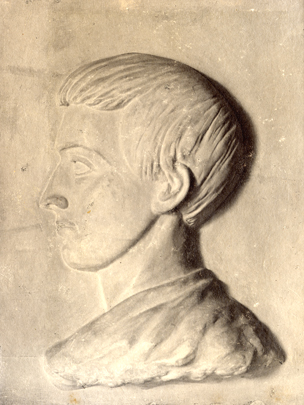 |
EMERSON IN HIS
FAMILY
CHARLES CHAUNCY EMERSON (1808-1836) 70. Photograph of bas relief (medallion head) of Charles
Chauncy Emerson, from Emerson family photograph album; original plaster
medallion in Emerson House. Album from the estate of Amelia Forbes
Emerson, 1982.
Emerson had a particularly warm relationship with his youngest brother Charles, who, like their older brother William, was also a lawyer. Charles’s presence in Concord, where he courted Sam Hoar’s daughter Elizabeth and held a position in Hoar’s law office, was one of the factors that influenced Ralph Waldo Emerson in his decision to settle here. Charles lived with Waldo and Lidian. He and Elizabeth Hoar planned to marry in 1836 and to make their first home with the Emersons on the Cambridge Turnpike. Waldo and Charles Emerson shared an interest in literature. They discussed Coleridge and Shakespeare together. Emerson respected and learned from his brother’s literary sensibility, as well as valuing his sympathy and advice in personal matters. Charles preceded his older brother in speaking out on slavery. In 1836, Charles succumbed to tuberculosis, which had already
claimed Emerson’s first wife Ellen and his brother Edward. His death
overwhelmed Emerson with grief. He later published several pieces
by Charles in The Dial, including one on Shakespeare in the first
issue of the journal (July, 1840). The entire Emerson family remained
close to Elizabeth Hoar until her death in 1878.
“And so, Lidian, I can never bring you back my noble friend who was my ornament my wisdom & my pride.—A soul is gone so costly & so rare that few persons were capable of knowing its price and I shall have my sorrow to myself for if I speak of him I shall be thought a fond exaggerator. He had the fourfold perfection of good sense, of genius, of grace, & of virtue, as I have never seen them combined. I determined to live in Concord, as you know, because he was there, and now that the immense promise of his maturity is destroyed, I feel not only unfastened there and adrift but a sort of shame at living at all.”—RWE to Lidian Emerson, May 12, 1836 “In Charles, I found society that indemnified me for almost total seclusion from all other. He was my philosopher, my poet, my hero, my Christian. Of so creative a mind that … yet his conversation made Shakspear more conceivable to me; such an adorer of truth that he awed us, and a spirit of so much hilarity & elegancy that he actualized the heroic life to our eyes … I cannot tell you how much I miss him I depended on him so much. His taste & its organs his acute senses were our domestic oracle. His judgment, his memory were always in request. Even his particular accomplishments, who shall replace to me? He was an excellent Greek scholar and has recently read with me, more properly to me, a dialogue of Plato & the Electra of Sophocles. But why should I pore over my vanished treasures when I ought rather to remember the happiness … in which light I certainly do regard his life even whilst I deplore him—viz as in the whole a Vision to me out of heaven and a perpetual argument for the reality& permanence of all that we aspire after … I can gather no hint from this terrible experience, respecting my own duties I grope in greater darkness & with less heed.”—RWE to Harriet Martineau, May 30, 1836.
No image in this online display may be reproduced in any form, including electronic, without permission from the Curator of Special Collections of the Concord Free Public Library.
Next Entry - Previous Entry - Back to Section VI Contents Listing - Back to Exhibition Introduction - Back to Exhibition Table of Contents |